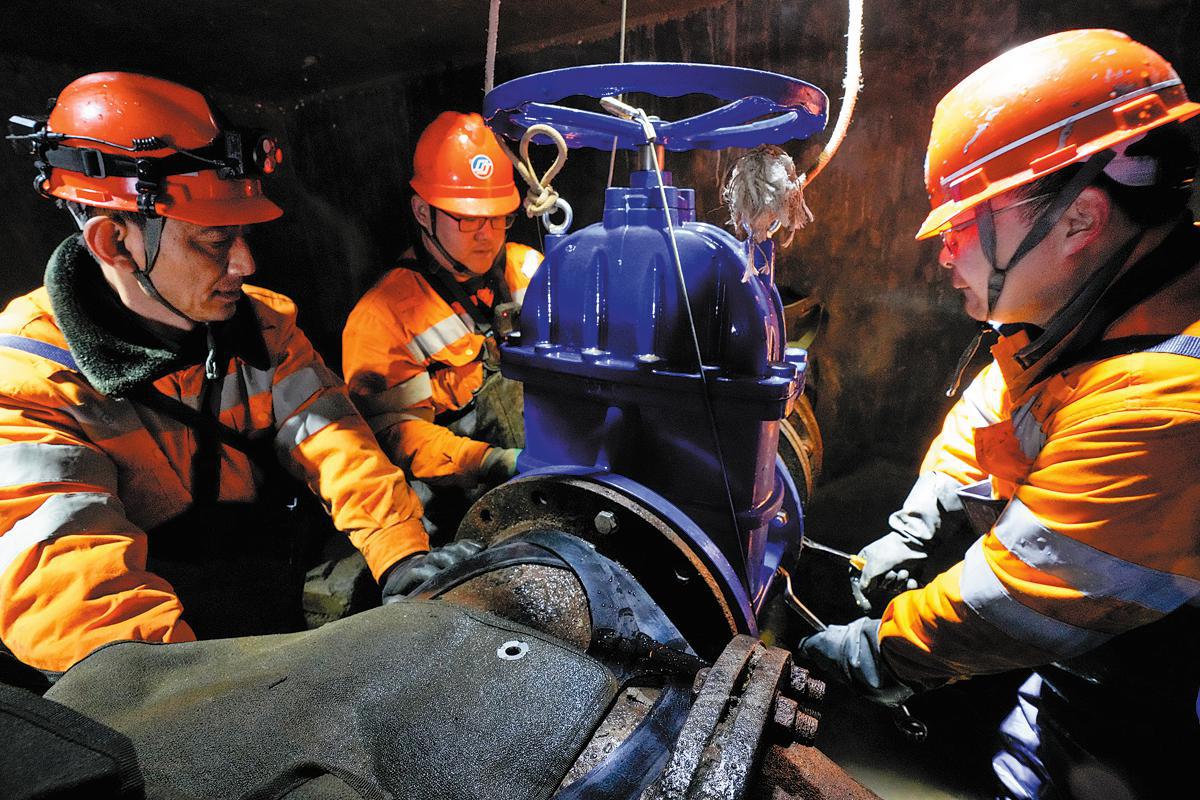
Pipeline workers of Jixi Hydropower Section replace a leaking valve in the main water supply pipeline.
As an important railway hub in Shandong province, Jinan West Station regularly experiences substantial influxes in travelers, particularly during peak periods like the Spring Festival travel rush.
Behind a key part of the station's efficient operations are the Jixi Hydropower Section pipeline workers, who inspect the station's water supply pipelines and facilities to ensure the passengers' access to clean water.
On Jan 8, a team of five pipeline workers carried out routine checks on valve equipment. During their work they discovered a leaking valve in the main water supply pipeline to the station, necessitating immediate replacement.
To prevent disruptions to the regular train services, they waited until the final train service of the night had been completed before commencing the repair work.
"The area around the well is slippery and wet. Everyone must maintain a secure footing for personal and operational safety," said team leader Zhao Liming.
At midnight, the workers, dressed in heavy-duty gear and equipped with headlights, began their tasks.
Their duties included shutting off the water supply station-wide, depressurizing the system, draining the water, removing the old valve and installing the new valve — a process that took approximately four hours.
After collectively lifting the heavy well cover, they conducted ventilation tests to ensure the air quality inside the well before descending.
Within the confined space of the well, with water levels reaching 20-30 centimeters deep, the workers loosened the bolts connecting the valve to the pipeline to release water for depressurization.
When the valve suddenly released, water gushed out, prompting a swift evacuation from the well.
Seated on the ground, despite the cold night, the workers' faces were glistening with sweat.
They used two water pumps to drain the well, revealing the underground pipeline after about 50 minutes of pumping.
Zhao led two workers back into the well where they attached a hoist hook to the old valve to lift it out.
They then positioned the new valve, weighing over 150 kilograms, into its designated spot, securing each bolt to ensure a tight connection with the pipeline.
Around four hours later, their tasks were completed.
In addition to ensuring water supply for passenger trains, the pipeline workers also oversee the maintenance of water supply pipelines for freight trains.
Since 1989, Zhao has been dedicated to water supply operations at the Jixi Hydropower Section, and has witnessed the evolution of this field.
"In the early years, we only had rubber shoes for underwater work. Now, we have full-body overalls for such operations," said Zhao.
"Areas once monitored manually now can be monitored by real-time surveillance," he said.
With technological advancements, steam locomotives gave way to electric locomotives and high-speed trains, prompting upgrades in water supply equipment.
Over his 35-year career, Zhao has personally witnessed the shift from manually operating water cranes for steam locomotives to overseeing advanced automatic water supply systems.
"Water supply systems have been modernized, incorporating automatic disinfection systems, leak detectors and other cutting-edge equipment," said Zhao.